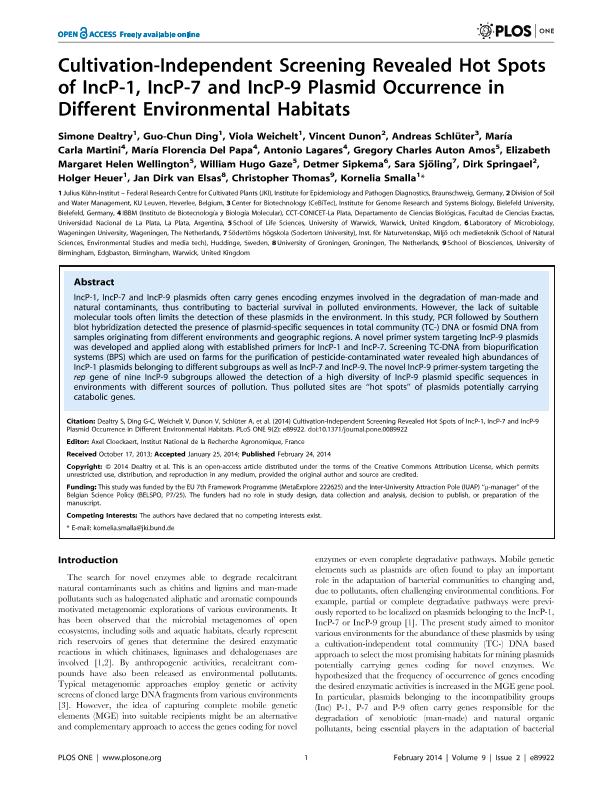Mostrar el registro sencillo del ítem
dc.contributor.author
Dealtry, Simone
dc.contributor.author
Ding, Guo Chun
dc.contributor.author
Weichelt, Viola
dc.contributor.author
Dunon, Vincent
dc.contributor.author
Andreas, Schlüter
dc.contributor.author
Martini, María Carla

dc.contributor.author
del Papa, Maria Florencia

dc.contributor.author
Lagares, Antonio

dc.contributor.author
Auton Amos, Gregory Charles
dc.contributor.author
Wellington, Elizabeth Margaret Helen
dc.contributor.author
Gaze, William Hugo
dc.contributor.author
Sipkema, Detmer
dc.contributor.author
Sjoiling, Sara
dc.contributor.author
Springael, Dirk
dc.contributor.author
Heuer, Holger
dc.contributor.author
van Elsas, Jan Dirk
dc.contributor.author
Thomas, Christopher
dc.contributor.author
Smalla, Kornelia
dc.date.available
2021-01-25T17:14:27Z
dc.date.issued
2014-02
dc.identifier.citation
Dealtry, Simone; Ding, Guo Chun; Weichelt, Viola; Dunon, Vincent; Andreas, Schlüter; et al.; Cultivation-independent screening revealed hot spots of IncP-1, IncP-7 and IncP-9 plasmid occurrence in different environmental habitats; Public Library of Science; Plos One; 9; 2-2014; 9-15
dc.identifier.issn
1932-6203
dc.identifier.uri
http://hdl.handle.net/11336/123601
dc.description.abstract
IncP-1, IncP-7 and IncP-9 plasmids often carry genes encoding enzymes involved in the degradation of man-made and natural contaminants, thus contributing to bacterial survival in polluted environments. However, the lack of suitable molecular tools often limits the detection of these plasmids in the environment. In this study, PCR followed by Southern blot hybridization detected the presence of plasmid-specific sequences in total community (TC-) DNA or fosmid DNA from samples originating from different environments and geographic regions. A novel primer system targeting IncP-9 plasmids was developed and applied along with established primers for IncP-1 and IncP-7. Screening TC-DNA from biopurification systems (BPS) which are used on farms for the purification of pesticide-contaminated water revealed high abundances of IncP-1 plasmids belonging to different subgroups as well as IncP-7 and IncP-9. The novel IncP-9 primer-system targeting the rep gene of nine IncP-9 subgroups allowed the detection of a high diversity of IncP-9 plasmid specific sequences in environments with different sources of pollution. Thus polluted sites are ??hot spots?? of plasmids potentially carrying catabolic genes.
dc.format
application/pdf
dc.language.iso
eng
dc.publisher
Public Library of Science

dc.rights
info:eu-repo/semantics/openAccess
dc.rights.uri
https://creativecommons.org/licenses/by-nc-sa/2.5/ar/
dc.subject
PLASMID
dc.subject
ENVIRONMENT
dc.subject
INCOMPATIBILITY GROUPS
dc.subject
POLLUTION
dc.subject.classification
Bioquímica y Biología Molecular

dc.subject.classification
Ciencias Biológicas

dc.subject.classification
CIENCIAS NATURALES Y EXACTAS

dc.title
Cultivation-independent screening revealed hot spots of IncP-1, IncP-7 and IncP-9 plasmid occurrence in different environmental habitats
dc.type
info:eu-repo/semantics/article
dc.type
info:ar-repo/semantics/artículo
dc.type
info:eu-repo/semantics/publishedVersion
dc.date.updated
2020-04-02T15:03:08Z
dc.journal.volume
9
dc.journal.pagination
9-15
dc.journal.pais
Estados Unidos

dc.journal.ciudad
San Francisco
dc.description.fil
Fil: Dealtry, Simone. Julius Kühn-Institut; Alemania
dc.description.fil
Fil: Ding, Guo Chun. Julius Kühn-Institut; Alemania
dc.description.fil
Fil: Weichelt, Viola. Julius Kühn-Institut; Alemania
dc.description.fil
Fil: Dunon, Vincent. Division of Soil and Water Management, KU Leuven; Bélgica
dc.description.fil
Fil: Andreas, Schlüter. Universitat Bielefeld; Alemania
dc.description.fil
Fil: Martini, María Carla. Universidad Nacional de La Plata. Facultad de Ciencias Exactas. Departamento de Ciencias Biológicas. Instituto de Biotecnología y Biología Molecular; Argentina
dc.description.fil
Fil: del Papa, Maria Florencia. Universidad Nacional de La Plata. Facultad de Ciencias Exactas. Departamento de Ciencias Biológicas. Instituto de Biotecnología y Biología Molecular; Argentina
dc.description.fil
Fil: Lagares, Antonio. Universidad Nacional de La Plata. Facultad de Ciencias Exactas. Departamento de Ciencias Biológicas. Instituto de Biotecnología y Biología Molecular; Argentina
dc.description.fil
Fil: Auton Amos, Gregory Charles. University of Warwick; Reino Unido
dc.description.fil
Fil: Wellington, Elizabeth Margaret Helen. University of Warwick; Reino Unido
dc.description.fil
Fil: Gaze, William Hugo. University of Warwick; Reino Unido
dc.description.fil
Fil: Sipkema, Detmer. Wageningen University; Países Bajos
dc.description.fil
Fil: Sjoiling, Sara. Sodertorn University; Suecia
dc.description.fil
Fil: Springael, Dirk. Division of Soil and Water Management, KU Leuven; Bélgica
dc.description.fil
Fil: Heuer, Holger. Julius Kühn-Institut; Alemania
dc.description.fil
Fil: van Elsas, Jan Dirk. University of Groningen; Países Bajos
dc.description.fil
Fil: Thomas, Christopher. University of Birmingham; Reino Unido
dc.description.fil
Fil: Smalla, Kornelia. Julius Kühn-Institut; Alemania
dc.journal.title
Plos One

dc.relation.alternativeid
info:eu-repo/semantics/altIdentifier/url/http://www.plosone.org/article/fetchObject.action?uri=info%3Adoi%2F10.1371%2Fjournal.pone.0089922&representation=PDF
dc.relation.alternativeid
info:eu-repo/semantics/altIdentifier/doi/http://dx.doi.org/10.1371/journal.pone.0089922
Archivos asociados
